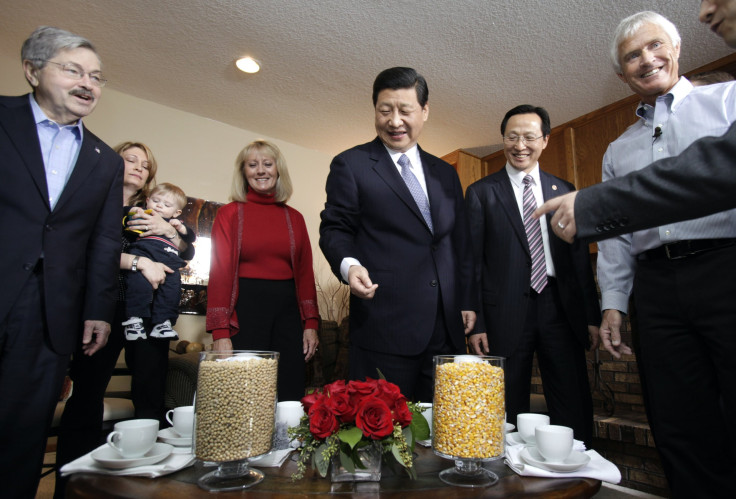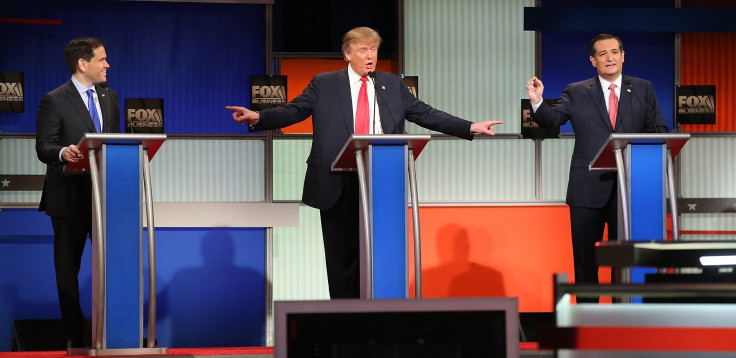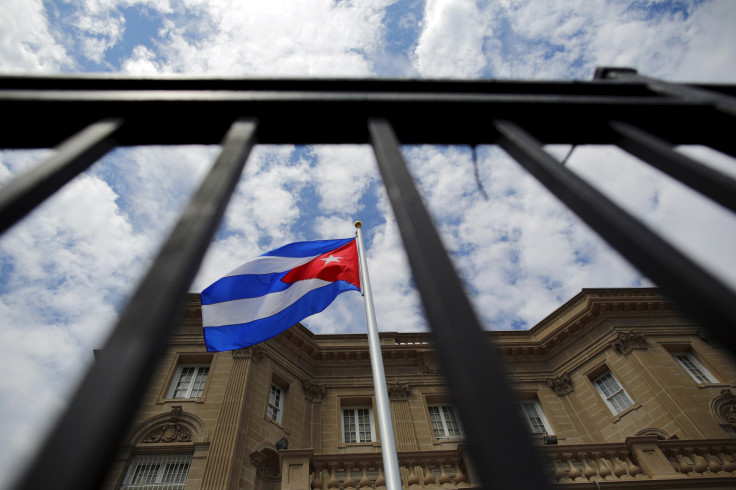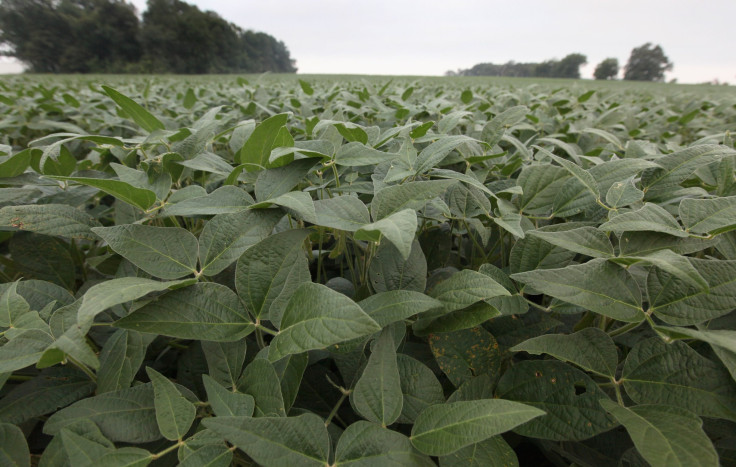China And Cuba Show Importance Of International Trade For Iowa

The 6,000 acres of Iowa farmland Grant Kimberley and his family have tilled for six generations sits dormant amid subfreezing temperatures. Once the ground has thawed in the spring, however, corn and soybean seeds will be planted up and down the rows. And come harvest time, much of the crop will be headed to China.
China and Cuba have been the targets of sneers on the faces of some 2016 Republican U.S. presidential candidates who take tough, no-nonsense rhetorical approaches to both countries and their alleged offenses on issues ranging from currency manipulation to human rights. But while Iowans generally agree with the presidential hopefuls on some of their points, they quietly sing a slightly different tune when asked about trading their state’s goods internationally. Foreign nations may act horribly, they say, but let’s keep trading with them, rather than build walls between ourselves.
“We certainly recognize that in some cases we have some governments out there that aren’t playing by the rules. That doesn’t mean you throw out the rules,” said Bill Northey, Iowa’s secretary of agriculture. “We have [some candidates] who sometimes seem like they want to throw out the rules and put up barriers around the country and others who seem like they want to fix things.”
That difference may tip the scales in Iowa’s caucuses Monday, pushing voters away from GOP candidates such as billionaire businessman Donald Trump, who has repeatedly used China as a scapegoat for American economic woes while advocating an isolationist approach; U.S. Sen. Ted Cruz of Texas, who has made aggressive foreign policy toward China and other countries a major pillar of his campaign; and U.S. Sen. Marco Rubio of Florida, who also has displayed distrust of the nation with the world’s second-largest economy. Meanwhile, both Cruz and Rubio have criticized the reopening of diplomatic ties with Cuba.
The stakes are high in Iowa, where the first U.S. presidential-nomination contest will be conducted. Winning in the early-voting state, despite its diminutive size, can provide momentum that impresses campaign contributors and voters in other states. Trump currently leads there with 31.4 percent support, according to the RealClearPolitics average of all Iowa Republican presidential polling data. He is followed by Cruz, with 25.2 percent, and Rubio, with 14.4 percent.

The relationship between the Iowans and the Chinese has been decades in the making. Thirty years ago, Chinese President Xi Jinping — then a low-level government official — took a trip to the small eastern Iowa town of Muscatine on an agricultural-research tour that would ultimately change the relationship between the rural Midwestern state and the rising world superpower. He met with farmers and government officials, developing a professional bond that would lead to a mutually beneficial trade relationship that is cherished by farmers in Iowa and actively cultivated by Gov. Terry Branstad. Xi has been back since those early days and even visited the Kimberley family farm in 2012.
Such close ties have led to rising exports from Iowa to China that in 2014 reached almost $1 billion and made the country the fourth-biggest foreign buyer of the state’s goods, according to U.S. Census Bureau statistics. Soybeans and other agricultural goods are among the largest of these exports: In September, the two sides struck a deal that will see China buy $5.3 billion worth of soybeans from Iowa farmers. That’s enough to buy nearly the total volume of soybeans Iowa produces in one year, and soybeans are the state’s No. 1 crop.
“I think those kinds of [relationships] make a big difference,” said Kimberley, who is also the director of market development for the Iowa Soybean Association. “Would they buying anyway? Yeah, but it helps to really position our state and our country to be the first supplier of choice. If all else is equal, price dictates and drives a lot of this, but [good relationships help] keep you competitive.” He declined to indicate who he plans to vote for Monday.

However, Trump has expressed a different view with his tough talk on China. “When was the last time anybody saw us beating, let’s say, China in a trade deal? They kill us. I beat China all the time. All the time,” the candidate said on at least one occasion.
If Trump, Cruz and Rubio have espoused confrontational, albeit sometimes mixed, positions on China during the presidential campaign, their messages on Cuba are much clearer. With respect to the plans announced by President Barack Obama in late 2014 to reopen relations with the Caribbean country, the Republican candidates have recoiled.
“It’s absurd and it’s part of a long record of coddling dictators and tyrants that this administration has established,” Rubio has said of the U.S.-Cuba deal.
Among Iowans interested in robust exports of their agricultural goods, however, the perspective is more nuanced. Concern about the political issues that have defined the U.S.-Cuba relationship most of the past six decades aside, Cuba is a promising potential market for agricultural products, many Iowans said.
“First Russia, then Iran, now Cuba — this is one more very, very bad deal brokered by the Obama administration,” Cruz has said, attacking a series of the president’s foreign-policy moves.
In the past year and a half, while Cruz and Rubio have condemned the diplomatic thaw, citing personal and human-rights concerns, Iowa officials went on a trade mission to Cuba to begin developing a relationship that could potentially net the state as much as $70 million more in agricultural exports a year should the long-standing embargo be lifted.
“I think most people are like me: They look at Cuba and, ‘Yeah, we don’t like the human-rights [abuses],’ said Fred Grunder, the chairman of the Muscatine County Republicans organization. However, he noted, China is one of Iowa’s biggest trade partners and it doesn’t have a very good human-rights record, either. Grunder plans to caucus for Hewlett-Packard Co. CEO Carly Fiorina Monday. “Cuba is no worse than anybody else in many instances, and I think most of us feel that way. Yeah, we want them to straighten out a little bit but don’t understand why we trade with one country and not the other.”

Meanwhile, the leading Republican presidential candidates appear somewhat blind to these relationships on the campaign trail. Whether it’s simply opposing the Trans-Pacific Partnership trade agreement governing trading practices between the U.S. and a number of other countries on the Pacific Rim — as both Trump and Cruz have done — or using explosive rhetoric against Chinese and Cuban politicians, these candidates sometimes seem to gloss over the importance of Iowa’s international trade.
“When you look at some of the political rhetoric versus some of the trade discussions, there does seem to be a disconnect,” said Chad Hart, an associate professor of economics at Iowa State University. He contended voters “are looking for someone who is pro-trade, pro-agriculture, and China is in that mix of issues that we’re looking at there.”
© Copyright IBTimes 2025. All rights reserved.






















